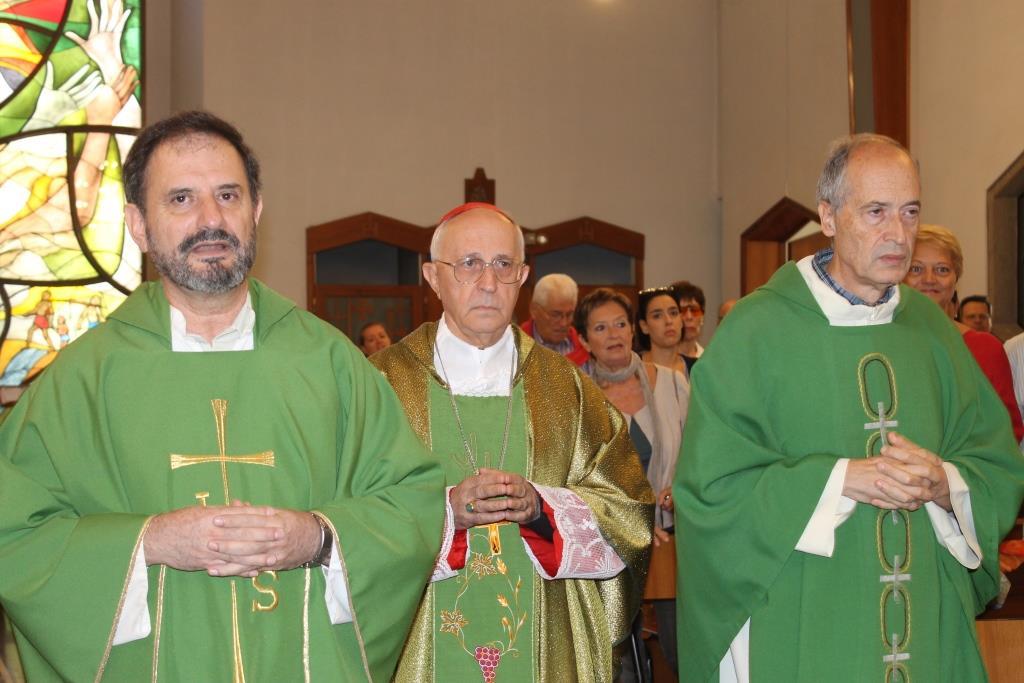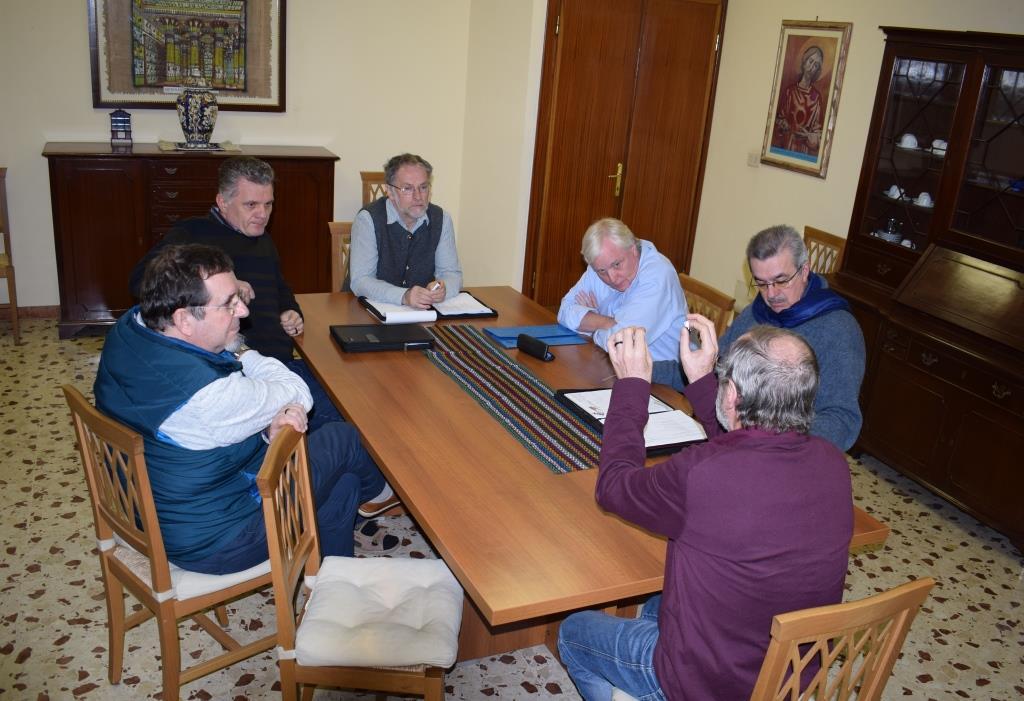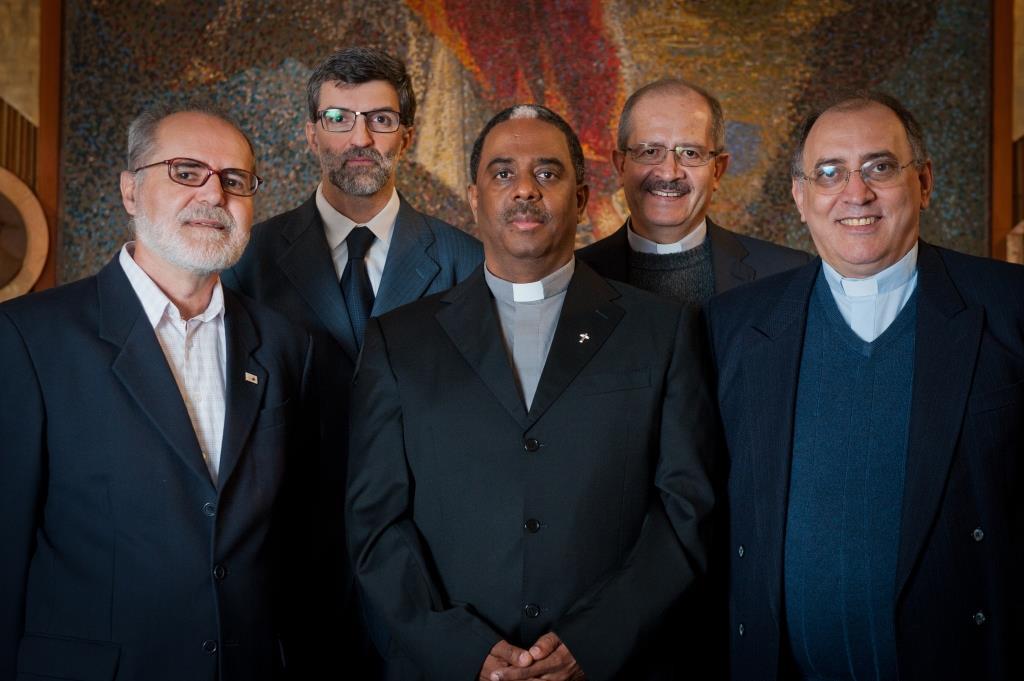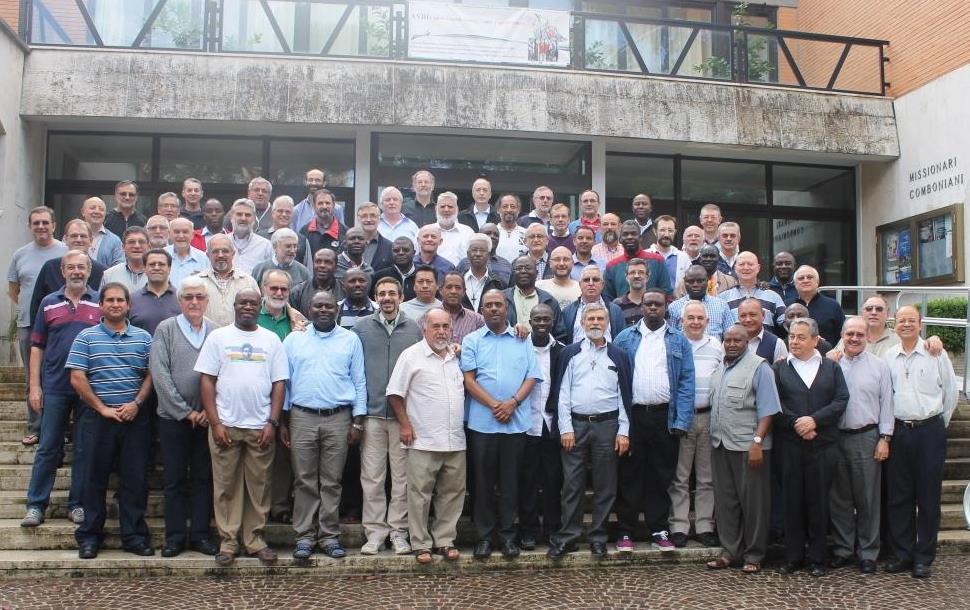Daniel Comboni
Comboni Missionaries
Institutional area
Other links
Newsletter
Monday, September 28, 2015
Cardinal Fernando Filoni, Prefect of the Congregation for the Evangelization of Peoples, visited yesterday the Comboni Missionaries at their XVIII General Chapter, which is taking place from September 6 to October 4 at the General House in Rome. His Eminence presided over the Eucharist. After listening to the Word of God, Cardinal Filoni shared his reflection based in particular on the relationship between the Apostolic Exhortation of Pope Francis “Evangelii Gaudium” and the theme of the XVIII General Chapter “Comboni missionary disciples called to live the joy of the Gospel in today’s world.” Below we publish the full text of his homily.
In the picture above, from left:
Fr. Enrique Sánchez G.,
superior general;
Cardinal Fernando Filoni,
Prefect of the Congregation
for the Evangelization of Peoples,
and Fr. Alberto Pelucchi,
vicar general.
HOMILY
The theme of your XVIII General Chapter, “Comboni missionaries disciples called to live the joy of the Gospel in today’s world”, taking place in recent weeks in this General house, made me immediately think that the inspiring element of the General Chapter has been the Evangelii Gaudium and, consequently, how the Comboni Missiona- ries are today called to the joyous service of the Gospel.
Two aspects then struck me as the most significant. The first aspect is inspired by the Apostolic Exhortation of Pope Francis, namely the document with which the Holy Father wished to indicate, at the beginning of his pontificate, his vision of the Church and the Church’s evolvement in the coming years: both centred on Jesus Christ and his Gospel, as the Pope writes in the very first paragraph of the Document. The second aspect is about how you Comboni missionaries are called to participate in this vision and this journey of the Church in the coming years.
I must then immediately tell you my joy at being able to have this moment of prayer and especially to celebrate this Eucharist with you today in the context of your General Chapter: not only because your work also concerns the Congregation for the Evangelization of Peoples, interested to know what you, Comboni Missionaries, will decide for the near future in your missionary work, but also because your presence here is representative of all your confreres who in all parts of the missionary world have placed their lives at the service of the Gospel. This, therefore, gives me the opportunity to express to you my deepest gratitude and appreciation for your service to the Gospel, to the Church and to the poor, in keeping with the well-known words of Jesus: announce that the Kingdom of God is here in our midst, that the blind receive their sight, the lame walk, the lepers are cleansed, the dead are raised, the poor have the gospel preached (cfr. Mt 11:5).
Furthermore, I’m pleased that in your theme you have also picked up the second word of the Apostolic Exhortation, namely the word “gaudium”, joy, to be taken as the common denominator not only of your work here, but also of the quality that you want to give to your missionary commitment in the coming years, a joyful effort. Of this feature, that is “joy”, the Pope speaks already in the second paragraph of the Apostolic Exhortation, which has as title “A joy ever new, a joy which is shared”, namely: l) a joy renewed in our encounter with Christ, 2) a joy as announcement of salvation, 3) a joy that accompanies the missionary service of charity.
In this context, one understands well the words of Pope Francis, like the Church’s “dream of a missionary option capable of transforming everything” (n. 27); “I would like a mission to be bold and creative” (33); “I think of a mission embodied within human limitations” (n. 40 ff.); I would like a “missionary heart” open to the weak and the poor (n. 44); I would like a Church which “goes forth”, “with a door open” (n. 46), “home to the marginalized” (n. 53), which “evangelizes” cultures (n. 69), the environment, both in nature as well as in the cities with their “half citizens and urban remnants” (n. 74). The Pope writes that he would like a permanent missionary spirituality in the Church, putting at the same time on guard against three robberies: “Let us not allow ourselves to be robbed of our missionary enthusiasm” (n. 78 et seq.), “let us not allow ourselves to be robbed of the Gospel!” (N. 97), “let us not allow ourselves to be robbed of our missionary vigour!” (n. 109).
This view – that of the opening to which the Pope calls us, inclusive, positive and non-marginalizing – it seems to me that it is put well in evidence in today’s three liturgical readings. In the first reading, where Moses reproaches both Joshua and those with him who were ready to accuse the two men, Eldad and Medad, who prophesied in the camp without being invested as the other 70 seniors. Moses rebukes Joshua and the others of false zeal, because tainted by jealousy: “Are you jealous on my account? If only the whole people of the Lord – Moses exclaimed – were prophets!”
Even Jesus, in the Gospel, reprimands his disciples, jealous that someone, without being a disciple like them, cast out demons in the name of Jesus himself. “You must not stop him – said the Master – because no one who does a miracle in my name is likely to speak evil of me.” (Mk 9,39).
We cannot be jealous of the gifts of God, of his Spirit; we must not consider ourselves as the persons in charge, with the power to be ourselves those who decide of the way, space and amount of the Lord’s graces. Conversely, where there is a gift of God we are called to rejoice. To act differently it would mean that we do not seek the glory of God and the service of others, but seek ourselves.
In this perspective, we also understand the harsh expressions of the Apostle James we hear in the second reading: storing up means losing, with the result that the moths eat what we have being hording, the rust corrodes even what appears durable, thieves take away the treasure. It is a kind of language that does not tend to regret or to soften but to, almost ruthlessly, recall the truth and to expose the most hidden feelings.
Dear missionary brothers, dear brothers and sisters in Christ, I leave these brief considerations not as a wise man speaking, but as a brother who is the first to be called to conversion to the Gospel. This is really what we need and to which Christ calls us.

Fr. Alberto Pelucchi, vicar general, welcomed Cardinal Fernando Filoni.














